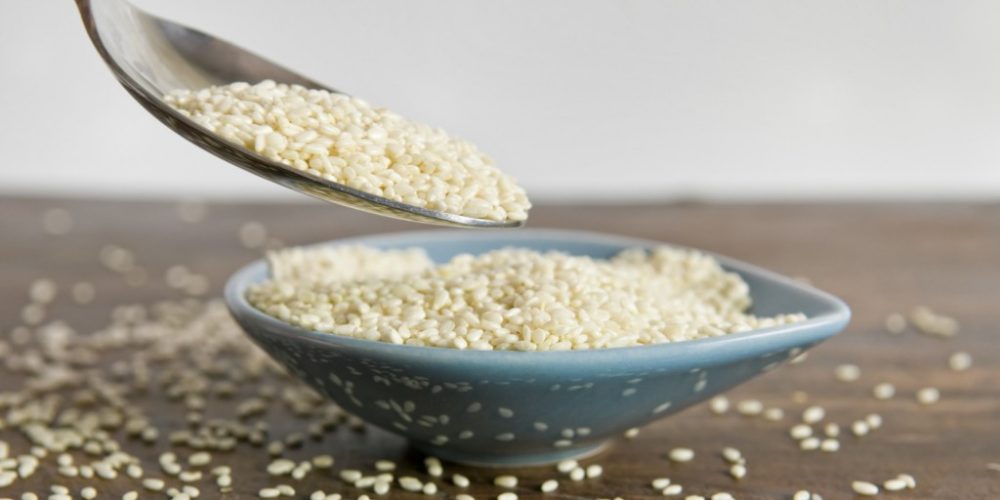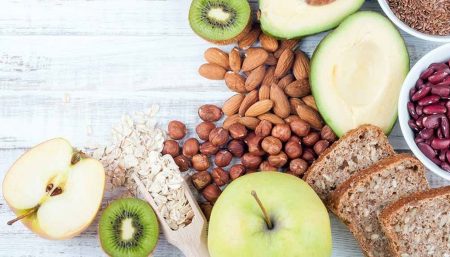
It is a flowering plant in the genus Sesamum with innumerable health benefits. The flowers of the sesame seed plant are yellow, though they can vary in colour with some being blue or purple.
Sesame is grown primarily for its oil-rich seeds, which come in a variety of colors, from cream-white to charcoal-black. In general, the paler varieties of sesame seem to be more valued in the West and Middle East, while both the pale and black varieties are prized in the Far East. The small sesame seed is used whole in cooking for its rich nutty flavour (although such heating damages their health-giving polyunsaturated fats), and also yields sesame oil. The seeds of the sesame are a good source of calcium.
Half a cup of sesame seeds contains three times more calcium than half a cup of whole milk? In addition to being an excellent dietary source of calcium, sesame seeds are also a good source of manganese, copper, magnesium, iron, phosphorus, vitamin B1 (thiamin), zinc, vitamin E, healthy protein, and fiber.
Sesame Seed contains lignans and phytosterols. In rodent studies, sesame oil consumption has a positive influence on blood glucose, glycosylated hemoglobin, lipid peroxidation, and antioxidant levels in diabetic rats.
Health benefits of sesame seeds
Delicious, crunchy sesame seeds are widely considered healthful foods. They are high in energy but contain many health benefiting nutrients, minerals, antioxidants and vitamins that are essential for wellness.
The seeds are especially rich in mono-unsaturated fatty acid oleic acid, which comprise up to 50% fatty acids in them. Oleic acid helps to lower LDL or “bad cholesterol” and increase HDL or “good cholesterol” in the blood. Research studies suggest that Mediterranean diet which is rich in mono-unsaturated fats help to prevent coronary artery disease and stroke by favoring healthy lipid profile.
The seeds are also very good source of dietary proteins with fine quality amino acids that are essential for growth, especially in children. Just 100 g of seeds provide about 18 g of protein (32% of daily-recommended values).
In addition, sesame seeds contain many health benefiting compounds such as sesamol (3, 4-methylene-dioxyphenol), sesaminol, furyl-methanthiol, guajacol (2-methoxyphenol), phenylethanthiol and furaneol, vinylguacol and decadienal. Sesamol and sesaminol are phenolic anti-oxidants. Together, these compounds help stave off harmful free radicals from the body.
Sesame is amongst the seeds rich in quality vitamins and minerals. They are very good sources of B-complex vitamins such as niacin, folic acid, thiamin (vitamin B1), pyridoxine (vitamin B6), and riboflavin.
100 g of sesame contains 97 mcg of folic acid, about 25% of recommended daily intake. Folic acid is essential for DNA synthesis. When given in expectant mothers during peri-conception period, it may prevent neural tube defects in the baby.
Niacin is another B-complex vitamin found abundantly in sesame. About 4.5 mg or 28% of daily-required levels of niacin is provided by just 100 g of seeds. Niacin help reduce LDL-cholesterol levels in the blood. In addition, it enhances GABA activity inside the brain, which in turn helps reduce anxiety and neurosis.
The seeds are incredibly rich sources of many essential minerals. Calcium, iron, manganese, zinc, magnesium, selenium, and copper are especially concentrated in sesame seeds. Many of these minerals have vital role in bone mineralization, red blood cell production, enzyme synthesis, hormone production, as well as regulation of cardiac and skeletal muscle activities.
Just a hand full of sesame a day provides enough recommended levels of phenolic anti-oxidants, minerals, vitamins and protein.
It is a powerhouse of organic minerals, especially calcium, and is an alkaline food that supports bone and general health. Whole sesame seeds contain about 88 mg of calcium per tablespoon of seeds. Just a quarter cup of natural sesame seeds provides more calcium than a whole cup of milk. A quarter cup of raw natural sesame seeds has 351 mg of calcium while one cup of non-fat milk has 316.3 mg, and one cup of whole milk has only 291 mg of calcium. Plus, they are alkaline whereas milk is acidic. Studies show that the calcium levels are slightly higher when the seeds are toasted. For example, one could get 27 percent of their daily value of calcium in one ounce of whole sesame seeds, but 28 percent if the seeds are roasted. Likewise, one ounce of hulled raw kernels will get give you 2 percent of your daily value of calcium. That number doubles when the kernels are toasted.
